Tue 29 Sep 2009
A TV Mini-Series Review: STATE OF PLAY (BBC, 2003).
Posted by Steve under Reviews , TV mysteries[5] Comments
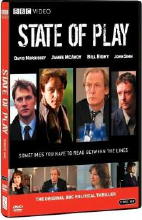
STATE OF PLAY. BBC-TV, 2003. [6 x 60m miniseries] John Simm, David Morrissey, Kelly Macdonald, Bill Nighy, Amelia Bullmore, Benedict Wong, Rebekah Staton, Philip Glenister, Polly Walker, James McAvoy, Marc Warren. Screenwriter: Paul Abbott; director: David Yates.
First of all, do not confuse this with the film produced in the US in 2009 starring Russell Crowe, Ben Affleck, Rachel McAdams, Helen Mirren and Robin Wright Penn.
No matter how good this latter group of actors may be, and no matter how many names you recognize in the US production over that of the BBC series, when it comes down to sheer entertainment value, I doubt that there’ll be much comparison. In the overall scheme of life and a list of things that are possible, this doesn’t seem to be one of them.
But I say that without having seen the US version. On the other hand, it’s just been released on DVD, so I’m sure I’ll give it a try. If and when I do, I’ll report back later.

Having spent all of last week – eight hours’ worth — watching the BBC version and being completely enthralled, I don’t see how reducing the running time down to two hours can possibly improve either the story or the characterizations. (The eight hours includes watching each of the first and last hours twice, the second time in each case with running commentary.)
Much of the miniseries takes place in the newsroom of a busy London newspaper, and although I’ve not been in a newsroom recently — not since I gave up my job reviewing mysteries for the Hartford Courant — it looked and felt to me as authentic as actually being there: a huge room bustling with people working and moving around with individual reporters’ desks with stacks of papers and files and anything else that a reporter might want his or her hands on at a moment’s notice.
It was difficult, in fact, to come down from the giddy feeling produced by the top-notch overall atmosphere, the competitive camaraderie, the highs of stories when they’re panning out followed by the lows when they’re not, especially when the latter are caused by management buckling under pressure from those up above concerned with the bottom line, or even worse, from the government in the form of the police or some agency involved with rules and regulations regarding, perhaps, the oil industry.
Dead in a railway accident is Sonia Baker, a research assistant to Stephen Collins (David Morrissey), a up-and-coming Member of Parliament who’s chairing The Energy Select Committee.
When he falls apart in tears at an ensuing press conference, his secret’s out. Although married with two young children, he’d been having an affair with the dead girl.
Was it an accident, or was it suicide? Of course we (the viewer) know better than that.
On the story from the beginning is the suitably scruffy Cal McCaffrey (John Simm), with a little more inside information than any other reporter since he’s a friend of Collins and at one time his campaign manager.

Complicating matters considerable is the affair that McCaffrey ends up in with Collins’ wife (Polly Walker). This adds an edge to an ever-widening story that points more and more to a grand conspiracy going on, but the facts could not be more elusive, always seemingly just out of reach.
Every once in a while the British accents made some of the dialogue undecipherable but not once did I find the problem unmanageable. Surprising enough, I found the broad Scottish accent of reporter Della Smith (Kelly Macdonald) more understandable that some of the British ones, once my ear became more and more accustomed to it.
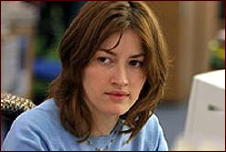
All of the players are marvelous, pitch perfect (other than accents) in every way, including (and especially) Bill Nighy as Cameron Foster, the managing editor. He’s urbane, witty, snippy, dedicated and slightly acerbic in each and every situation where he needs to be each of the above.
One flaw, if there is one, may also be a large one. The ending, while a totally natural one in one sense, also seems grafted on (or retrofitted, if you will), and it takes some effort to reconcile it some of the earlier threads of the plot — and there are a lot of them!
Forgiving that is easily done, however, given the overall high quality of the presentation, and how delightfully and completely enjoyable the entire production is.
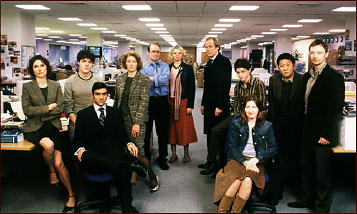
September 30th, 2009 at 5:53 pm
I was not going to comment on this because I agree with everything Steve said about this high quality British TV series. But I see no one has commented, so I thought I’d second Steve’s review and recommend buying this dvd set.
I also recommend buying a multi-region dvd player so you can play dvds from all around the world, especially the British mystery and detective dvds which are available on amazon.com.UK. Frankly I’ve found that the British mystery series make the American series look pretty poor. There are a few excellent USA series like THE WIRE, THE SHIELD,and HOMICIDE,LIFE ON THE STREETS, etc. but for the most part the British series are so much better.
September 30th, 2009 at 7:23 pm
Luckily for me, since I still don’t have a multi-region DVD player, STATE OF PLAY is available in the US as a Region 1 set.
I don’t want anybody to misunderstand Walker and use the fact that the series is a BBC production as an excuse for not watching it!
October 1st, 2009 at 12:48 am
Walker
I agree about the multi-region players (and they don’t cost any more than the regular ones in most cases), and about the British television series. Of course one reason for the superiority of the British product is that they only do a relatively few episodes a season, and they are willing to do closed series like this one that just aren’t done by American television.
By doing fewer episodes high quality performers like Bill Nighy, Helen Mirren, Derek Jacobi, and Judi Dench are available to do series television without making a commitment that cuts into their stage and film work. And if the series fails or succeeds it doesn’t hurt their other careers.
We’ve only recently caught up in terms of creative control of series with people who find it no real problem to work in television, movies, and even comic books at the same time.
It’s not unusual for someone like Anthony Horowitz to write Poirot, Foyle’s War, and his bestselling juvenile novels in England. It’s becoming more common here, but it hasn’t moved to the actors quite yet. There are still actors who while not major stars limit themselves to film and stage alone. In England there has always been much more crossover between the three.
And it may just come down to the fact that the creative talent in England looks upon themselves as professionals, while too often here they see themselves as celebrities. Professionals do the work and take pride in it. Celebrities have too many other things tied up in what they do.
Plus, let’s be fair. If State of Play wasn’t a hit by it’s second episode here we would never see the final one. The Brits are willing to commit even to the rare failures. I’m not sure that will ever be true in the money driven world of American commercial television. But at least we have programs like State of Play.
April 13th, 2011 at 10:06 pm
This is a first rate miniseries, but I think it might be an episode or two . . . too long. And why demonize the U.S. oil industry, when you have international companies like Shell Oil and more specifically, BP to demonize?
February 9th, 2012 at 3:32 pm
I have a few problems with this miniseries – especially in Episodes 4 to 6. And I think the Dominic Foy story line was stretched a bit too thin. However, it is still a very entertaining production.
[“The Brits are willing to commit even to the rare failures. I’m not sure that will ever be true in the money driven world of American commercial television. But at least we have programs like State of Play.”]
British television and commercialism is just as money driven as it is here in the U.S. Do not fool yourself.